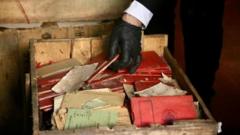The recent discovery of crates containing Nazi documents in the basement of Argentina's Supreme Court has drawn significant interest from historians and government officials. These documents, which include membership booklets and propaganda material, were originally sent to Argentina aboard a Japanese steamship in 1941, only to be seized by customs due to their suspicious content.
Rediscovered Nazi Documents Shed Light on Argentina's Historical Ties

Rediscovered Nazi Documents Shed Light on Argentina's Historical Ties
Argentina's Supreme Court uncovers crates of documents linked to Nazi Germany, raising concerns and historical inquiries.
The crates, containing historical material intended to propagate Adolf Hitler's ideology within Argentina during World War II, were uncovered last week. As workers cleared the basement in preparation for moving the Supreme Court's archives to a newly established museum, they stumbled upon the wooden crates. Initial assessments revealed photographs and literature promoting Nazi ideals, according to a statement from the court.
The documents had been shipped from the German embassy in Tokyo and had been labeled as "personal effects." Despite this, Argentine customs officials suspected their contents could threaten Argentina’s neutral position during the war. After opening five of the 83 diplomatic pouches and finding Nazi propaganda inside, an Argentine judge ordered that all pouches be seized.
These documents have remained largely untouched since their confiscation, presenting an opportunity for historians to uncover further insights into Nazi financial networks and their connections to Argentina. The Supreme Court has contacted the Buenos Aires Holocaust Museum for assistance in inventorying the collection.
Historically, post-World War II Argentina became a haven for several high-ranking Nazi officials, prompting later governments to publicly acknowledge the country's role in sheltering war criminals. The culmination of these findings reflects Argentina's complex historical relationship with Nazi Germany and its implications for contemporary society.
The documents had been shipped from the German embassy in Tokyo and had been labeled as "personal effects." Despite this, Argentine customs officials suspected their contents could threaten Argentina’s neutral position during the war. After opening five of the 83 diplomatic pouches and finding Nazi propaganda inside, an Argentine judge ordered that all pouches be seized.
These documents have remained largely untouched since their confiscation, presenting an opportunity for historians to uncover further insights into Nazi financial networks and their connections to Argentina. The Supreme Court has contacted the Buenos Aires Holocaust Museum for assistance in inventorying the collection.
Historically, post-World War II Argentina became a haven for several high-ranking Nazi officials, prompting later governments to publicly acknowledge the country's role in sheltering war criminals. The culmination of these findings reflects Argentina's complex historical relationship with Nazi Germany and its implications for contemporary society.


















